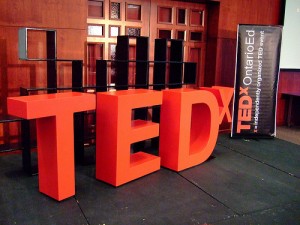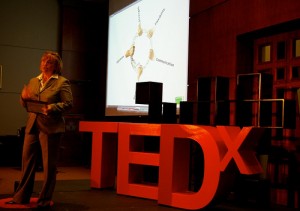“Speed Dating” my way through TEDxOntarioEd … further reflections on a wonderful evening
In my last post, I shared the gist of a talk I gave at a locally organized TEDxOntarioEd event. For someone accustomed to participating at conferences and teaching in a minimum two hour time block, I spent agonizing weeks writing and rewriting and paring down my diatribe to fit the tight time line hoping that in the end, it would still make sense. The weeks (yes, weeks) that went into preparing for this was a time of enormous reflection – over about 27 years of teaching, and trying to tease out those salient ‘bits’ that were transformational to my experience and those of the students I taught.
I have been searching for a way to express what it felt like to be a part of this event. As an academic interested in multiliteracies pedagogy, the presentations represented a virtual feast of multiliteracies practices and for the rest of the weekend, I found myself unable to stop thinking about it.
I have decided that participating in the TEDxOntarioEd event might be comparable to ‘speed dating’; short but intense moments to get to know some remarkable people.
The evening started with the unmatchable energy of Ray Zahab, a man who personifies energy, commitment and a zeal for life that he works hard to bring to our students through the development of online educational resources. In many ways, his works seems to ‘take us along’ on the amazing adventures he experiences.
Nathan Toft and Jane Smith shared their PortablePD and PortableRadio ideas and the playful banter in their presentation revealed how energizing and fun working creatively with colleagues can be.
Joey Savoy’s presentation highlighted some amazing work he is doing in Miramichi, New Brunswick. I could spend serious time learning from each of these people!
Zoe Branigan-Pipe presented her talk in the form of a very moving and inspirational letter to her mother, a retired teacher who clearly left an indelible impression through her own modeling of innovative practice. Zoe has picked up the torch and her online work suggests makes me think she is the Ray Zahab of the online world!
We were treated to a delightful virtual presentation by Tim Long, writer and producer for the Simpsons, that made us laugh as he reminded us about what was both inspiring – and uninspiring about schools.
Lee LeFefer’s skills at expressing himself clearly and succinctly in three minutes (Common Craft: In Plain English) made our 5 minutes seem extravagant! It is a talent!
Alec Couros, an educator that many of us have followed for some time in the virtual world, battled some technological challenges – but his ‘freedom sticks’ and the happy dance came across loud and clear, and demonstrated problem-solving skills mix well with humour!
I spent some time in the ‘green room’ with a young secondary school teacher named Danika Barker. Danika and I were both rehearsing what we wanted to say while also checking out Dan Misener’s brand new iPad. I knew my anxiety surrounded my ability to stick to a script so that I didn’t meander outside of the time allotment. I have followed Danika, and read her blog, and her presentation of her classroom NING illustrated a thoughtful, reflective and pedagogically powerful use of social networking tools in the classroom.
Jesse Brown’s presentation walked us through his experiences in school, suggesting that for him, doodling was a necessity in order to allow himself to be able to focus on what the teacher was saying. As the creator of Bitstrips for Schools, he highlighted the value of visual literacy as an important approach to meaning making. Needless to say, the graphics on his presentation were amazing!
The entire evening was catered by the way, by the ‘Screaming Avacado Canteen’ under the leadership of speaker Paul Finklestein. Paul’s energy suggests that he runs marathons everyday at school as he uses ‘food’ to help students find productive paths in life. As I had only myself to ‘get ready’ that day, I was humbled by what Paul has accomplished in a day, let alone in his career.
Tim, a student from Lambton Kent was our final presenter. Whether he realized it or not, Tim (and all of our students) were really the reason we were all there. Every one of us had been motivated by students in some way to do the things we do. I suspect that Tim’s talk will resonate with teachers and students around the world. Although he describes himself as a ‘teacher’s nightmare’, I think that sometimes institutional constraints create nightmares for both teachers and students. Tim described himself as ‘At Risk’, a term widely used in Ontario to allow students access to certain types of programs. This term has bothered me for some time, and as I watched Tim speak, I could not help but think how ‘At Promise’ would have been more fitting.
To the TEDx OntarioEd Committee, Jamie Reaburn Weir, Ben Hazzard, Rodd Lucier, Sharon Drummond, Kim McGill and Colin Jagoe – all I can say is ‘Wow’. Great job and, I get it. As much as it was obvious the work and organization that went into pulling together such a wonderful evening, working in creative, engaging ways with like-minded individuals is powerfully energizing. Thanks for the rush!

